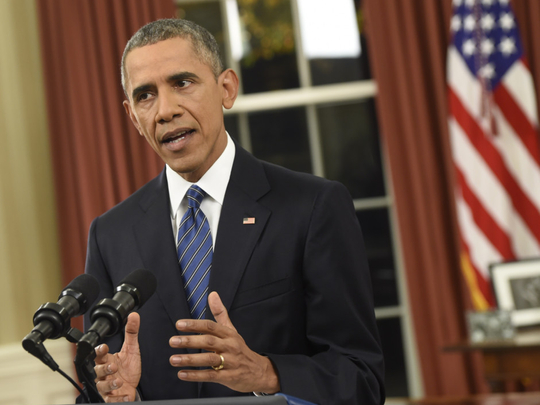
Eloquence is rare in American politics. But running for president in 2007 and 2008, Barack Obama had it, knew it and occasionally exploited it to dazzling effect.
By contrast, speaking to the nation last Sunday night, on both the threat of terrorism and the threat of over-reacting to it, the United States president seemed dulled and emotionally spent. Appearing uninspired himself, he failed to inspire.
Political analyst Charlie Cook wrote that Obama was pressed “to address an almost impossible situation about which there really isn’t much you can say or do”. Perhaps it’s simply too much to expect even a gifted orator to exhort the people to put their fears and passions in a rational compartment and quietly stand down.
That, after all, was more or less Obama’s message the other night: Don’t panic. Don’t pay attention to Donald Trump. Carry on. Such rhetoric inevitably has a duller edge than a call to arms. As Lyndon Johnson once remarked in a different context, peace translates as a passive “condition”, war as an active “event”. Only one makes the patriot’s blood boil.
Obama has looked — to succumb, for a moment, to pure Trumpism — a bit “low energy” of late. Is it possible that the presidency itself has a trajectory, with presidential rhetoric peaking in the thick of political battle before trailing off at some unfocused point toward the end of a depleted second term? Might that point for Obama be passed?
I asked political scientist Matthew Dickinson of Middlebury College whether presidents just peter out over time. He was sceptical, saying there’s no reason they should summon less inspiration in the late innings. As evidence, he cited Obama’s widely praised eulogy in June for the Reverend Clementa Pinckney in Charleston, South Carolina.
“What happens is that a president’s remarks become less consequential, which may create the impression that, rhetorically, he is petering out” Dickinson wrote via email. “This is a function of several factors. First is the dwindling audiences for his remarks. Consider the State of the Union address: Same format, same function every year, but audiences tend to get smaller each year throughout a president’s time in office, absent a focusing event (9/11 affecting 2003, Monica Lewinsky affecting 1998).”
The subdued theme of Obama’s remarks was a downer, but the war oratory of previous presidents could be surprisingly subdued as well. Even amid the jingoistic rush after the sinking of the Maine in Havana harbour in 1898, for example, President William McKinley worked to distance himself from “hasty acts of blind resentment”, seeking to assure the public that his actions were guided by dispassion and facts.
Dispassion may be easier to sell paired with a vengeful war than with Obama’s trickier anti-terrorism agenda, which practically invites partisan attack. Dickinson wrote: “The difficulty Obama faced after Paris and especially San Bernardino is to say, essentially, ‘We need to stay the course and not overreact here’. Meanwhile, his political opponents are screaming that these incidents reflect a failure of his anti-terrorist policy — and of his leadership. They don’t have to demonstrate that their alternative strategy — more boots on the ground, banning Muslims from entering the United States etc — would work any better. The burden of proof thus falls on Obama to explain why Americans should stay the course after 14 Americans are killed, which seems clear proof to many people that something is not working.
Obama’s rhetorical opposite is Trump, whose typical speech seeks to escalate passions and unleash prejudices — feats he accomplishes without resort to eloquence. Trump’s staying power in the Republican race is still in question; it’s been a long time since we’ve seen his model at work on the presidential level.
But if Trump retains his grip on the Republican base in the months ahead, Obama may need to rouse his oratorical better self.
— Bloomberg










